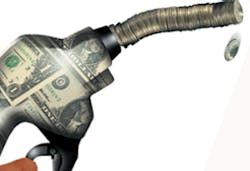Oil Price Information Service (OPIS) analysts forecast the national average price for both diesel and gasoline will soon rise above the $3 level—just as it did in the aftermath of Hurricane Katrina.
Wholesale diesel prices in the Gulf Coast are above $3, with $2.40-level prices in the Midwest and West Coast. All of this translates to $3 and beyond retail, OPIS said.
“[Media and energy analysts] talked about a “bullet being dodged” when Hurricane Rita didn't hit Houston with Category 4-5 implications,” Tom Kloza, OPIS publisher told FleetOwner in an email. “The reality is that we took several bullets-- not fatal, but we are bleeding profusely in terms of supply.”
According to the Energy Information Administration (EIA), the aftermath of Rita as of yesterday left eight refineries completely shut down, with another eight restarting or attempting to restart. An additional four refineries remain shut down after Katrina.
This amounts to a daily shortfall of one million barrels of gasoline and 800,000 barrels of distillate (which could be refined as either diesel or heating oil).
As of the week ending Sept. 25 the national average gasoline price rose 1.7 cents to $2.803 and diesel was up 6.6 cents to $2.798, EIA said. But these increases are only the tip of the iceberg, OPIS said.
“I think we’ll see around $3 for both gasoline and diesel and there will be pockets where prices will be significantly above $3,” Denton Cinquegrana, OPIS markets editor told Fleet Owner. “And that’ll last until we get the refineries back and running which will take a while. It’ll be tough through October and there will be the potential [that $3-level prices] will last longer, depending on the state of the refineries by then.
“Some refineries had pretty major damage,” Cinquegrana continued. “One company said their refinery will be down for two to four weeks, but that might be optimistic considering what needs to be done: cleaning the flooding, fixing damaged components and getting the refinery restarted. Some refiners have facilities with no power or running water and that will keep them from assessing damage and getting back to work on getting back up and running.”
Diesel prices are set to soar in both the near- and long term also due to persisting demand and the upcoming winter heating season, respectively.
“[Diesel] is the one product that finds demands at or above last year’s levels,” said Kloza. “I believe that retail diesel prices are headed to new record levels before Columbus Day, and then they will stabilize, but be prone to winter ‘super-spikes’ if temperatures get cold.”
Throughout the summer distillate supplies are stockpiled in preparation for winter heating oil demand, but recent refinery outages have forced the markets to withdraw from the reserves early. That sets the stage for these ‘super-spikes’ in the event of a cold winter, OPIS explained.
“Right now we’re expecting to see a pretty expensive winter for diesel and heating oil,” Cinquegrana said. “The price of heating oil is expected to rise substantially compared to last year and a cold winter could certainly be trouble— pray for a warmer than normal winter in the North East.”
About the Author
Sean Kilcarr
Editor in Chief
Sean Kilcarr is a former longtime FleetOwner senior editor who wrote for the publication from 2000 to 2018. He served as editor-in-chief from 2017 to 2018.
